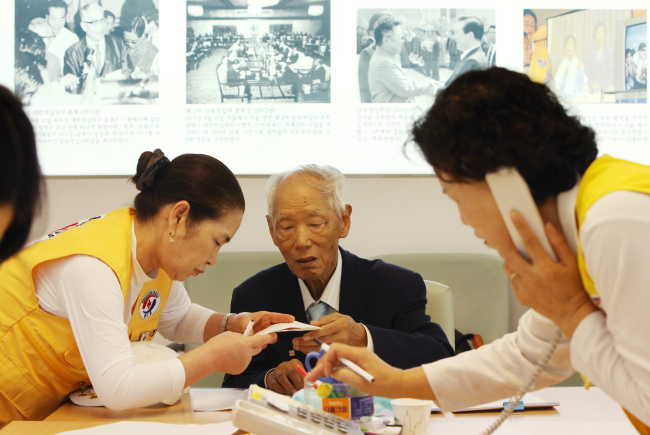The two Koreas held working-level Red Cross talks Monday to arrange the reunions of families separated by the border, with Seoul viewing the meeting as a barometer of Pyongyang’s will to improve cross-border ties.

An applicant consults officials at the Korean Red Cross headquarters in Seoul on Monday. (Yonhap)
The talks at South Korea’s Peace House in the border village of Panmunjeom came after they agreed last month to hold the reunions around Chuseok, a major Korean holiday that falls on Sept. 27, as part of a comprehensive deal to defuse military tensions.
Lee Deok-haeng, an executive committee member of the South Korean Red Cross, led his three-member delegation, while the other side was represented by Park Yong-il, a senior member of the North Korean Red Cross.
“We will do our best to live up to your expectations and hopes,” Lee told the press before the talks began in the morning to determine the date, venue, scale and other details of the reunions that have not been held since February 2014 amid cross-border tensions.
The South Korean side pushed to put a series of issues on the agenda, including exchanging lists of the surviving members of families divided after the end of the 1950-53 Korean War, allowing the families to exchange letters and meet through video links and holding the reunions on a regular basis.
Seoul has regarded the issue of the separated families as an urgent humanitarian one, a reason President Park Geun-hye proposed during her Aug. 15 Liberation Day speech that the two Koreas work together to identify those with loved ones across the border.
Last Tuesday, the South’s Red Cross began its survey of surviving members of the separated families. It presumes more than 66,000 people, including around 1,060 South Korean nationals living abroad, remain alive.
Seoul apparently hoped to hold the reunions at Mount Geumgangsan before Oct. 10, the 70th anniversary of the foundation of the North’s ruling Workers’ Party, around which time observers say the North could set off provocations to strengthen national unity and show off its military presence.
As the Red Cross talks began, hopes rose that the talks would lead to more cross-border dialogue to help improve bilateral ties that have continued to deteriorate with Pyongyang’s provocative acts and adherence to its nuclear program, and Seoul’s harsh reactions to them.
The meeting was the first since the Aug. 25 deal under which the two Koreas agreed to conduct a set of measures to reduce tensions and improve relations, including holding government-level talks and bolstering exchanges in various civil sectors.
Calling for the withdrawal of U.S. forces in the South, Pyongyang’s Foreign Ministry said Monday that the Aug. 25 deal showed the ability of the two Koreas to safeguard peace on the peninsula by themselves.
“We will gravely hold the U.S. responsible should another armed clash take place again for no reason in the future due to the U.S. refusing to withdraw its forces and staging provocative military acts,” said the North’s ministry in a statement carried by the North’s official Korean Central News Agency.
Meanwhile, Kim Gunn, director general for North Korean nuclear affairs at Seoul’s Foreign Ministry, met with his visiting Chinese counterpart Xiao Qian to discuss an array of North Korea-related issues including the reclusive state’s persistent pursuit of nuclear arms.
By Song Sang-ho (sshluck@heraldcorp.com)





![[Weekender] How DDP emerged as an icon of Seoul](http://res.heraldm.com/phpwas/restmb_idxmake.php?idx=645&simg=/content/image/2024/04/25/20240425050915_0.jpg&u=)
